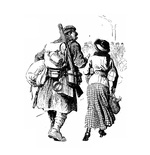
On Pilgrimage with Pope Francis
ESCHEWING SECURITY, HEADING FOR THE PERIPHERIES
In the Book of Revelation, a great voice from the throne says, “The former things have passed away” (21:4), and the One who sits upon the throne says, “Behold I make all things new” (21:5). If there is one thing that holds true about the election of Pope Francis, it is the novelty, the newness of it. Three “firsts” go a long way toward unlocking the enigma of the Bergoglio papacy: He is the first pope from the New World, and within that, of course, the first pope from Argentina. He is the first pope to call himself Francis. And he is the first Jesuit to become a pope.
Novelty often seems to contain within it a disregard for tradition. The two previous popes lived through what appears to have been the destruction of European civilization, of which the concentration camps are perhaps the most apt symbol. These popes’ concerns were largely to save Europe for the faith, and to save the faith for Europe and the world. Although St. John Paul II in particular reached out to the entire world, he remained profoundly rooted in the Catholic tradition of a Europe that had once been Christendom: His journeys were missions from that base.
Though John Paul called himself a pope “from a far country,” his homeland is but a long day’s drive from Rome. It is really Pope Francis who comes from the other side of the world. In a remarkable way, Jorge Bergoglio — son of northern Italy, though born in Argentina — returned to Europe from a different continent, and a different way of seeing reality. With the transition from “old world” popes to a “new world” pope, it is as if the settings on a kaleidoscope that had been fixed for many centuries were suddenly turned. In C.S. Lewis’s Chronicles of Narnia, Lucy Pevensie opines that people from south of the equator are so different because they spend all their lives “upside down.” Sometimes the differences between Francis and his predecessors are so striking that one is tempted to agree with her.
In a manner of speaking, we are all “on pilgrimage with Pope Francis.” What does it mean to be a pilgrim? A pilgrim has to be poor, has to be open to whatever God may give him. A pilgrim leaves settled routines, securities of all kinds, to place himself unreservedly into the hands of God and God’s providence. It is this leaving of all security in things of tradition and custom that Pope Francis seems to be accentuating. He seems to be calling those of us who live in the New World to share deeply in his own desire to “make all things new” in Christ, without being hamstrung by “the past.”
You May Also Enjoy
We Catholics have nowhere near the influence that our numbers and organization would suggest. Man for man, woman for woman, the U.S. Catholic community has a surprisingly modest impact on American public life.
Abortion was a crime in the extant states in 1868 and in the territories that became states after 1868 and the District of Columbia. Yet later, Roe was called “settled law”?
The traditional left and mainstream right are in the same camp, usually competing over the externals of governance, not the real substance of policy.

